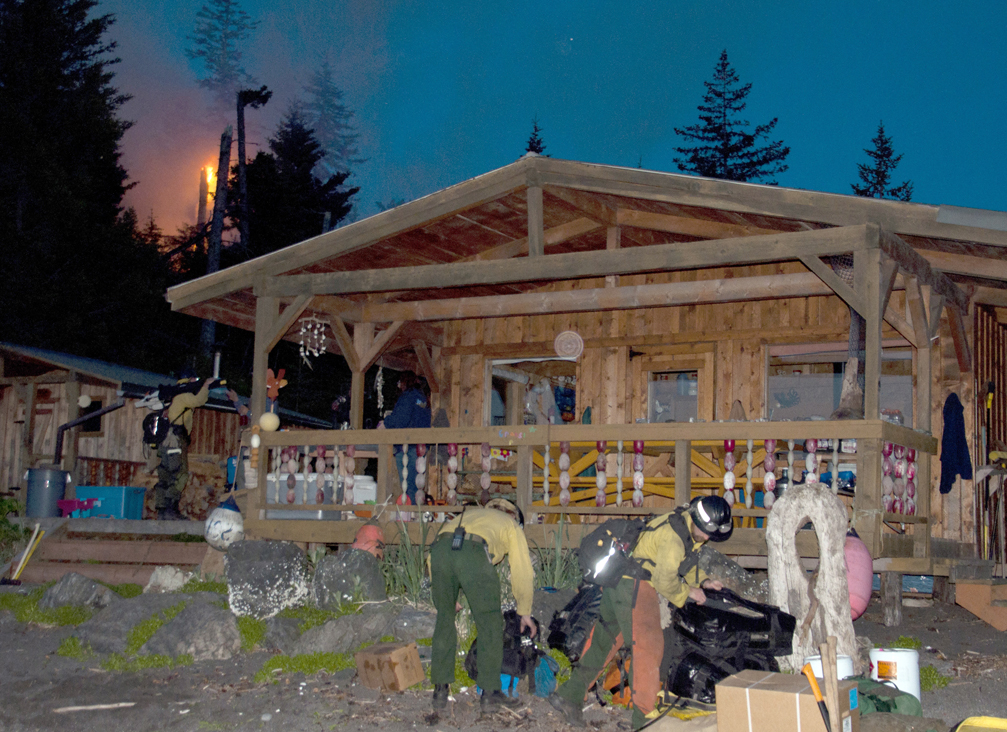A fire threatening inhabitants on Hesketh Island in Kachemak Bay was contained by Sunday after a response by Alaska Division of Forestry wildland fire and resource technicians and volunteer firefighters from Seldovia and the surrounding communities.
According to the neighbors, Nancy Klein’s sauna caught on fire last Thursdauy and a gust of wind spread it quickly to nearby brush. No residents were injured in the fire on the island. Everyone evacuated safely. Firefighters also had no injuries.
The fire was declared controlled and put into monitor status Sunday about 4 p.m., said Rob Berney, a Tongass National Forest Service firefighter. He also said that they were lucky it had rained only a day before, as the soil was much wetter than the previous week and made it easier to put out.
The fire was called in at 10:40 p.m. June 20, when Bryon Anderson and Phil Brudie spotted the fire from the other side of the island.
“We called 911 as soon as we could, and then came over to one of the houses closest to the fire to help them evacuate,” said Anderson.
The first firefighters arrived by Mako’s Water Taxi.
“It’ll be a long night,” said Matt James, the Division of Forestry Wildland Fire and Resource Technician commander from Homer, on the boat ride over.
Forestry firefighters talked about a plan of action, in case the island needed to be evacuated.
The firefighters arrived at Teresa Gray’s house, which was closest in line to the fire.
“Klein explained the situation to the neighbors and came over pounding on the door to wake me and my two little girls up,” Gray said. “Neighbors from Yukon Island came over to help me move my propane tanks and start digging a trench around my house in case the fire reached it.”
At the peak of the fire, it came within 40 to 50 yards of her house. The other houses on the island were upwind of the fire. In the summer months three families live on Hesketh Island.
Approximately 50 yards behind Gray’s house firefighters could see flames flaring up a 40-foot tree. A few years ago there was a spruce beetle epidemic, which can cause trees to instantly combust.
In the early hours of Friday morning, the volunteer Seldovia firefighters arrived to help the first four firefighters put out the flames. By 2 a.m. the flames were out, but there was still a lot of work ahead to cool down the ground and make sure there was no chance of it rekindling. Overnight the firefighters removed large diameter logs and stumps involved with numerous snags and trees that presented extensive mop up and hazards.
“It needed to be dealt with by a lot of chainsaw work and hours of pump use putting a lot of water on the fire,” said Berney.
The final size was about a half acre, according to the Division of Forestry firefighters, including Berney. He is on a two-week detail attached to the Homer and Soldotna branches of wildland firefighters.
Last week five additional firefighters from Oregon joined the Kenai Peninsula. Wildfire activity has yet to pick up in Oregon; their fire season generally occurs in July and August. This enables agencies like the Oregon Department of Forestry to send personnel all over the nation. Since early June, the department has sent 35 employees to four states, including Alaska, Arizona, Colorado and New Mexico. With more firefighters, Alaska is prepared for the fire season.
“The original four of us worked through the night until about 10 the next morning, when we were relieved by six additional guys from the Soldotna office,” Berney said.
Local people were grateful their homes had escaped the blaze.
“It came pretty close,” said Greg Tressler, a homeowner on the island. “I could see it from my property line. I’m very thankful the firefighters and local community helped us contain it.”
The Seldovia Firefighters are volunteer-based. Thursday night was the start of the annual Seldovia Summer Solstice Music Festival. Sisters Taylor and Ashley Haller said their father, who is fire chief and medic in Seldovia, got the crew together quickly and headed over to Hesketh Island.
Haller said, “This time of year, it is great to have emergency fire fighters (EFF’s).” Firefighters are preparing small communities and native villages with volunteers to protect themselves from fires.
A total of 76 fires were burning in Alaska this past Saturday, according to the Alaska Interagency Coordination Center. Most of these fires were ignited by lightning strikes, and are being allowed to go out on their own in a natural process. After a wildfire, cotton grass and willow re-sprout, which is beneficial to small, grazing animals. Animals adapted to life in the Arctic have coexisted with fires for thousands of years.
And the coexistence is much more apparent so far in summer 2013, with more fires expected to spark. As of Saturday, the total number of acres burned has already surpassed last year’s total of 287,000 acres.
This summer fire managers anticipate more lightning-caused wildfires. For now, it is a waiting game statewide.


